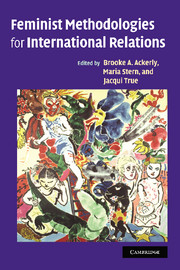Book contents
- Frontmatter
- Contents
- Notes on the contributors
- Acknowledgments
- 1 Feminist methodologies for International Relations
- Part I Methodological conversations between feminist and non-feminist IR
- Part II Methods for feminist International Relations
- 5 Motives and methods: using multi-sited ethnography to study US national security discourses
- 6 Methods for studying silences: gender analysis in institutions of hegemonic masculinity
- 7 Marginalized identity: new frontiers of research for IR?
- 8 From the trenches: dilemmas of feminist IR fieldwork
- 9 Racism, sexism, classism, and much more: reading security-identity in marginalized sites
- Part III Methodologies for feminist International Relations
- Conclusion
- Bibliography
- Index
8 - From the trenches: dilemmas of feminist IR fieldwork
Published online by Cambridge University Press: 12 January 2010
- Frontmatter
- Contents
- Notes on the contributors
- Acknowledgments
- 1 Feminist methodologies for International Relations
- Part I Methodological conversations between feminist and non-feminist IR
- Part II Methods for feminist International Relations
- 5 Motives and methods: using multi-sited ethnography to study US national security discourses
- 6 Methods for studying silences: gender analysis in institutions of hegemonic masculinity
- 7 Marginalized identity: new frontiers of research for IR?
- 8 From the trenches: dilemmas of feminist IR fieldwork
- 9 Racism, sexism, classism, and much more: reading security-identity in marginalized sites
- Part III Methodologies for feminist International Relations
- Conclusion
- Bibliography
- Index
Summary
Feminist research in the field embodies some of the most significant constraints and opportunities for rethinking the broader conceptions of social science research and its principles of classification, rules, and categories. Long imprisoned within the boundaries of its own realist/neorealist orthodoxy, the field of International Relations (IR) has yet to grapple seriously with the challenges posed by feminist interventions, which seek to reconfigure the very nature of “knowledge production,” that is, the accumulation, classification, interpretation, and (re)presentation of data. Feminists and other critical scholars have sought a basis for knowledge that does not conform to mainstream IR's rational-objective methodology. However, there is little agreement among them about which methods or techniques are more inherently suitable to the process of generating knowledge that is subjective, reflexive, and consenting to the notion of women as knowers.
This chapter uses methods to explore the difficult practice of translating experience into knowledge through fieldwork encounters. Fieldwork involves a series of methodological choices that allow the researcher to enter briefly the lives of those being researched and to generate knowledge by observing behavior, asking questions, and analyzing data. Often, the fieldwork location is far away from home, both figuratively and geographically. Crossing these intellectual, temporal, and spatial divides requires planning, travel, and acclimation to a new milieu. The laboratory for this exploration is fieldwork conducted by the author in Israel/Palestine between 1996 and 2000. The original research question underlying this project was whether women's definition of security is different from that of men in Israel.
- Type
- Chapter
- Information
- Feminist Methodologies for International Relations , pp. 153 - 173Publisher: Cambridge University PressPrint publication year: 2006
- 23
- Cited by



